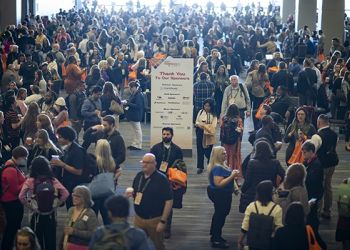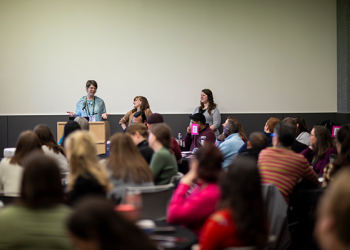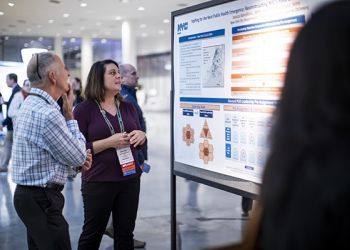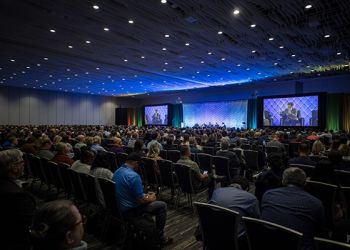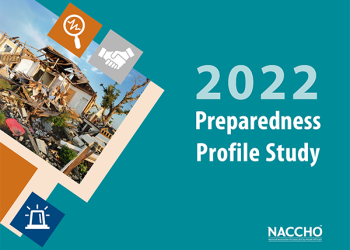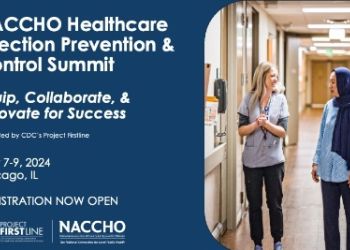On July 7–9, 2020, approximately 600 local public health professionals participated in NACCHO’s first ever virtual conference, NACCHO 360. Attendees participated in nearly 100 sharing sessions, learned from expert-led panels, and discovered solutions to improve public health in their communities.
This year’s theme, “Raising the Reach of Public Health,” focused specifically on how local public health professionals can build strong, effective cross-disciplinary partnerships. Each general session held its own focus, however; all echoed the importance of developing effective partnerships, addressing the social determinants of health, improving health equity, and telling compelling stories.
Attendees participated in the New Member and First Attendee event, focus groups, a forum for small local health departments (LHDs), and a Model Practices Quick Hits session that highlighted a few of this year’s winners.
Attendees also participated in several interactive workshops that covered different public health topics, including climate change, immunization, health equity, ethics, and workforce development.
The conference offered live interoperability demonstrations that explored COVID-related and other scenarios and showed how seamless health information exchange in public health can contribute to improve outcomes, engage consumers, and support regulations.
Tuesday: Leadership in Turbulent Times
Chief Executive Officer, Lori Tremmel Freeman opened the first plenary, “Leadership in Turbulent Times” by welcoming over 580 virtual attendees. She shed light on the challenges of responding to the COVID-19 pandemic and highlighted the efforts of health department staff in mitigating its spread.
NACCHO Immediate Past-President George T. Roberts, Jr., gave his past-presidential address and discussed the issues that local health officials are facing in the wake of the pandemic. He also shared many of NACCHO’s accomplishments of the past year and gave kudos to the front line workers responding to COVID-19.

Celeste Philip, MD, MPH, Deputy Director for Non-Infectious Diseases at the Centers for Disease Control and Prevention (CDC), spoke about how local public health is leading the COVID-19 response and stated, “Local health departments are our most valued partners in this work.” Dr. Philip went on to explain how the pandemic has created an opportunity for multiple sectors to act together as a public health system. In addition, Dr. Philip acknowledged the attack on public health officials by saying, “We’re all painfully aware of the departure of local public health officials and leaders, who are just trying to stand up and do the right thing. We know this isn’t an easy task, and CDC is here to work with NACCHO to stop this trend.”
Tomás Aragón, MD, DrPH, Health Officer of the City and County of San Francisco, and director of the Population Health Division at the San Francisco Department of Public Health defined public health leadership as the “the practice of mobilizing people, organizations, and communities to effectively tackle tough public health challenges.” Dr. Aragón closed with saying, “To be anti-racist, we need to open our minds to our own prejudices.” Emily Brown, MPH, CPH, NACCHO Board Member and the former Director for Rio Grande County Public Health in Colorado, provided suggestions when activated in emergency response, including finding support networks, taking care of your own health, setting limits, and frequent communication.
Gerard Giuliano, JD, Director for the Office of Public Health Legal Affairs at the Nassau County Department of Health in New York, highlighted his jurisdiction’s challenges in implementing essential services during the pandemic. He also discussed serving quarantine orders according to the law. Tuesday’s final keynote speaker, Columbia, South Carolina Mayor Stephen K. Benjamin, discussed the importance of building multisectoral relationships with public health officials and agencies. Mayor Benjamin went on to highlight the need to reimagine how society supports human potential.
Following Tuesday’s plenary was the “Future of Public Health” Town Hall, which discussed ways LHDs organize their work around the Essential Public Health Services and how that has changed during the COVID-19 pandemic.
Wednesday: The Power of Data
NACCHO Chief Executive Officer, Lori T. Freeman opened the day’s plenary, “The Power of Data,” and introduced new NACCHO President and Health Director of Farmington Valley Health Department (CT), Jennifer Kertanis.
Ms. Kertanis gave her presidential address and highlighted the need to focus on the root causes of heath inequity as communities protest the pervasive and ongoing injustices supported by long standing structural and institutional racism. She shared two main focuses of her upcoming term, which included advocacy for the investment in an adequately funded public health system and transforming public health practice that addresses the relationship between structural and institutional racism, and other forms of oppression and health inequity. She went on to challenge viewers to aim their sights further upstream and lend their public health voices to change.

Tom Frieden, MD, MPH, former Director of the Centers for Disease Control and Prevention and current President and CEO of Resolve to Save Lives, provided special remarks regarding COVID-19 response and the need to have a comprehensive approach for infection control. He highlighted the importance of risk communication by stating, “Info that’s easily understood will be more likely to be followed. Consistent, competent, and objective messaging, as well as, showing empathy, sincerity, and transparency are extraordinarily important.” Additionally, he called for sustained funding for global health security and a new approach to prevent, detect, and respond to health threats.
Jefferson E. McMillan-Wilhoit, Director for Health Informatics and Technology at Lake County Health Department and Community Health Center in Illinois was the first panelist to address viewers. He discussed how his department is reimagining data collected through community health assessments to diagnose his community. McMillan-Wilhoit emphasized the importance of sharing data with the community to build trust.
Paul Jarris, PhD, MBA, Chief Medical Advisor at MITRE Corporation talked about Sara Alert, a standards-based, open source tool, developed by MITRE in partnership with national public health organizations that automates the process of public health monitoring and reporting of individuals exposed to or infected with COVID-19 and other infectious diseases.
Caroline Fichtenberg, PhD, Managing Director of the Social Interventions Research and Evaluation Network at the University of California, San Francisco spoke about the pandemic shining a light on health injustices across the country.
Fernando De Maio, PhD, Director of Research and Data Use at the American Medical Association’s Center for Health Equity shared the idea of health equity data as protest, and offered insight into the tradition of radical statistics and how that contributes to equity work.
Following Wednesday’s plenary was the “Policy and Public Health Partnerships” Town Hall, which explored how local health and elected officials partner to make policy change to support their communities during a crisis.
Thursday: Racism and Inequity as a Public Health Crisis
NACCHO Chief Executive Officer, Lori T. Freeman opened the final plenary, “Racism and Inequity as a Public Health Crisis” by giving a State of NACCHO address.
Sandra Ford, MD, MBA, District Health Director of the DeKalb County Board of Health moderated the day’s plenary. The first speaker that Dr. Ford introduced was, Roy Wilson, MD, MS, President of Wayne State University. Dr. Wilson spoke on racial disparities in public health and noted, “If you have any doubts that racism is a public health issue, the lifetime risk of a black man dying at the hands of the police is greater than anyone dying of COVID-19.”

The first panel speaker, Jeannette Kowalik, PhD, MPH, MCHES, Commissioner of Health for the Milwaukee Health Department, spoke about her city’s mission to advance health and equity. She stated, “We need to continue to plan like #COVID19 is just going to be part of our lives. We must realize that there’s going to be a new normal. That new normal will be rooted in dismantling racism, and anti-Black racism to be more specific.” Sharon Day, MD, MBA, founder of the Indigenous Peoples Task Force, discussed racial disparities and inequities among indigenous. She encouraged white people to truly get to know and make friends with black, indigenous, and other people of color.
Gloria J. Browne-Marshall, JD, MA, Professor of Constitutional Law at John Jay College of Criminal Justice, touched on recent events and highlighted the killing of George Floyd by saying, “To see a man like George Floyd handcuffed, face down, and see the knee bearing down his neck - there was nearly 400 years of persecution bearing down on his neck.”
The final panel speaker, Camara P. Jones, MD, MPH, PhD, family physician and epidemiologist, expounded on this issue of racism by saying, “Racism unfairly disadvantages some people and communities, while unfairly advantaging others. This is the whole issue of unearned white privilege, and it’s not talked about enough because it makes some people, especially white people, uncomfortable.”
Following Thursday’s plenary was the “Shifting Community Power: Local Public Health and Community Organizing Collaborations to Confront the Root Causes of Racial Injustice and Health Inequity” Town Hall, which highlighted LHD and grassroots organizer collaborations, with a focus on how effective partnerships advance racial equity.
Conference attendees have full access to plenary and town hall recordings, sharing sessions, workshops, the exhibit hall, and other conference offerings. Save the date for NACCHO Annual 2021, June in Detroit. For more about the conference, visit http://nacchoannual.org.

